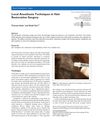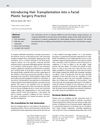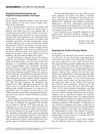4 citations,
January 2006 in “Indian Journal of Dermatology, Venereology and Leprology” Surgical hair restoration was the best permanent solution for baldness in 2005.
 3 citations,
May 2016 in “Journal of Cutaneous Medicine and Surgery”
3 citations,
May 2016 in “Journal of Cutaneous Medicine and Surgery” The document suggests using small syringes, distraction techniques, topical anesthetics, and specific drugs to ensure a pain-free experience during hair restoration surgery.
 3 citations,
August 1995 in “Journal of Clinical Laser Medicine & Surgery”
3 citations,
August 1995 in “Journal of Clinical Laser Medicine & Surgery” Using a CO₂ laser for hair transplants improves the surgery and may become important in future hair restoration.
 2 citations,
July 2018 in “Facial Plastic Surgery”
2 citations,
July 2018 in “Facial Plastic Surgery” Hair restoration can enhance a facial plastic surgery practice with careful patient selection and detailed follow-up.
 2 citations,
January 2016
2 citations,
January 2016 Hair restoration surgery can lead to issues like scarring, hair loss, and anxiety, but careful management before and after the procedure can minimize these complications.
 1 citations,
March 2019 in “Hair transplant forum international”
1 citations,
March 2019 in “Hair transplant forum international” Both hair transplant methods, FUE and FUT, show similar stress responses and growth abilities in hair cells.
 1 citations,
January 2010
1 citations,
January 2010 Asian women experiencing hair loss often feel embarrassed and unhappy, but hair transplantation can offer natural-looking results and improve their self-confidence.
 July 2024 in “Plastic and Aesthetic Research”
July 2024 in “Plastic and Aesthetic Research” Careful planning and accurate diagnosis are crucial for successful hair restoration surgery.
January 2021 in “Hair therapy & transplantation” New hair transplant methods now look more natural.
 May 2020 in “Hair transplant forum international”
May 2020 in “Hair transplant forum international” Younger people and those with existing acne are more likely to get folliculitis after hair restoration surgery, but it doesn't affect the overall good hair growth result.
 August 2019 in “Journal of The American Academy of Dermatology”
August 2019 in “Journal of The American Academy of Dermatology” The document concludes that using micropore tape on an 18-gauge needle can control depth in hair restoration surgery, reducing scalp trauma and complications.
 July 2014 in “Plastic and Reconstructive Surgery”
July 2014 in “Plastic and Reconstructive Surgery” Hair follicles stored in a special medium had the highest survival rate, and "plucked" follicles and follicular units showed better growth after transplant.

Plan hair-restoration surgery early for better results in male pattern baldness.
 July 2013 in “Journal of Plastic Reconstructive and Aesthetic Surgery”
July 2013 in “Journal of Plastic Reconstructive and Aesthetic Surgery” The book is a detailed guide on aesthetic plastic surgery, essential for surgeons in the field.
 November 2009 in “Hair transplant forum international”
November 2009 in “Hair transplant forum international” Doctors should collaborate with the patient's primary care physician to decide if it's safe to stop taking Plavix before hair restoration surgery, considering the risk and benefit.
 January 2008 in “Elsevier eBooks”
January 2008 in “Elsevier eBooks” More men are getting cosmetic surgery, with nose jobs and hair transplants being popular, and choosing a qualified surgeon is important.
 August 2003 in “International Journal of Cosmetic Surgery and Aesthetic Dermatology”
August 2003 in “International Journal of Cosmetic Surgery and Aesthetic Dermatology” Disposable instruments could be the future of hair restoration surgery to eliminate disease risk, but they require careful preparation and proper training.
 10 citations,
June 2001 in “International Journal of Cosmetic Surgery and Aesthetic Dermatology”
10 citations,
June 2001 in “International Journal of Cosmetic Surgery and Aesthetic Dermatology” Splitting single-hair grafts seems to improve perceived hair fullness without affecting growth, intact grafts grow slightly better, and the Mantis microscope is clear but slower without reducing damage to grafts.
 December 1989 in “The Journal of Dermatologic Surgery and Oncology”
December 1989 in “The Journal of Dermatologic Surgery and Oncology” New techniques and findings in dermatologic surgery show improved pain management, safer liposuction, better hair transplantation, and effective treatments for skin conditions.
 December 1999 in “Dermatologic Surgery”
December 1999 in “Dermatologic Surgery” Experts discussed sedation, hair transplant techniques, and called for respectful professional communication.
 4 citations,
July 2010 in “Journal of Plastic Reconstructive and Aesthetic Surgery”
4 citations,
July 2010 in “Journal of Plastic Reconstructive and Aesthetic Surgery” A man developed a rare cancer on his scalp after a hair transplant possibly due to sun damage, laser effects, and inflammation.
 September 2013 in “Hair transplant forum international”
September 2013 in “Hair transplant forum international” The document says doctors should identify and treat Frontal fibrosing alopecia medically before considering surgery, as treatments often don't work well.
 5 citations,
January 2017 in “Dermatologic Surgery”
5 citations,
January 2017 in “Dermatologic Surgery” Storing hair follicle micrografts for longer times can cause them to enter a state similar to the natural hair shedding phase, which might impact hair transplant results.
 1 citations,
July 2022 in “Journal of Cosmetic Dermatology”
1 citations,
July 2022 in “Journal of Cosmetic Dermatology” Inflammatory complications are rare after hair transplants but can happen months later, and checking for skin conditions before surgery is important.
 July 2012 in “Hair transplant forum international”
July 2012 in “Hair transplant forum international” Hair transplant improved self-perception in hair loss patients, but some still remained overly focused on their hair appearance.
 9 citations,
March 2007 in “Hair transplant forum international”
9 citations,
March 2007 in “Hair transplant forum international” Densitometry and video-microscopy are precise for evaluating hair loss and transplant success but need special equipment and training.
 1 citations,
May 2021 in “Journal Für Ästhetische Chirurgie”
1 citations,
May 2021 in “Journal Für Ästhetische Chirurgie” Doctors should thoroughly inform hair transplant patients about the procedure, risks, and costs to prevent dissatisfaction and legal issues.
 September 2013 in “Hair transplant forum international”
September 2013 in “Hair transplant forum international” Dr. Robert S. Haber concluded that hair transplant surgeons must master scalp biopsy techniques to quickly diagnose and treat hair loss conditions.
 September 2004 in “Atlas of the Oral and Maxillofacial Surgery Clinics”
September 2004 in “Atlas of the Oral and Maxillofacial Surgery Clinics” Hair restoration surgery techniques can effectively treat scalp deformities and have evolved to provide natural-looking results.
 6 citations,
July 2019 in “Journal of Cosmetic Dermatology”
6 citations,
July 2019 in “Journal of Cosmetic Dermatology” Surgeons make more mistakes in hair transplant procedures as they get tired or do more work.



























